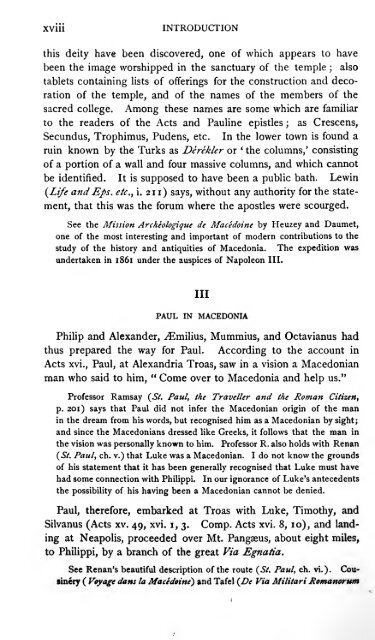Philippians and Philemon - MR Vincent - 1906.pdf
Philippians and Philemon - MR Vincent - 1906.pdf
Philippians and Philemon - MR Vincent - 1906.pdf
Create successful ePaper yourself
Turn your PDF publications into a flip-book with our unique Google optimized e-Paper software.
Xviii INTRODUCTION<br />
this deity have been discovered, one of which appears to have<br />
been the image worshipped in the sanctuary of the temple ; also<br />
tablets containing lists of offerings for the construction <strong>and</strong> deco-<br />
ration of the temple, <strong>and</strong> of the names of the members of the<br />
sacred college. Among these names are some which are familiar<br />
to the readers of the Acts <strong>and</strong> Pauline epistles ; as Crescens,<br />
Secundus, Trophimus, Pudens, etc. In the lower town is found a<br />
ruin known by the Turks as Derekler or ' the columns,' consisting<br />
of a portion of a wall <strong>and</strong> four massive columns, <strong>and</strong> which cannot<br />
be identified. It is supposed to have been a public bath. Lewin<br />
{^Life <strong>and</strong> Eps. etc., i. 211) says, without any authority for the state-<br />
ment, that this was the forum where the apostles were scourged.<br />
See the Mission Archeologique de Macedoine by Heuzey <strong>and</strong> Daumet,<br />
one of the most interesting <strong>and</strong> important of modern contributions to the<br />
study of the history <strong>and</strong> antiquities of Macedonia. The expedition was<br />
undertaken in 1 861 under the auspices of Napoleon III.<br />
Ill<br />
PAUL IN MACEDONIA<br />
Philip <strong>and</strong> Alex<strong>and</strong>er, .^milius, Mummius, <strong>and</strong> Octavianus had<br />
thus prepared the way for Paul. According to the account in<br />
Acts xvi., Paul, at Alex<strong>and</strong>ria Troas, saw in a vision a Macedonian<br />
man who said to him, " Come over to Macedonia <strong>and</strong> help us."<br />
Professor Ramsay (. Paul, the Traveller <strong>and</strong> the Roman Citizen,<br />
p. 201) says that Paul did not infer the Macedonian origin of the man<br />
in the dream from his words, but recognised him as a Macedonian by sight;<br />
<strong>and</strong> since the Macedonians dressed like Greeks, it follows that the man in<br />
the vision was personally known to him. Professor R. also holds with Renan<br />
(5 Paul, ch. v.) that Luke was a Macedonian. I do not know the grounds<br />
of his statement that it has been generally recognised that Luke must have<br />
had some connection with Philippi. In our ignorance of Luke's antecedents<br />
the possibility of his having been a Macedonian cannot be denied.<br />
Paul, therefore, embarked at Troas with Luke, Timothy, <strong>and</strong><br />
Silvanus (Acts xv. 49, xvi. i, 3. Comp. Acts xvi. 8, lo), <strong>and</strong> l<strong>and</strong>-<br />
ing at Neapolis, proceeded over Mt. Pangaeus, about eight miles,<br />
to Philippi, by a branch of the great Via Egnatia.<br />
See Renan's beautiful description of the route (5/. Paul, ch. vi.). Cousinery<br />
( Voyage dans la Macedoine) <strong>and</strong> Tafel {De Via Militari Romanorwn





